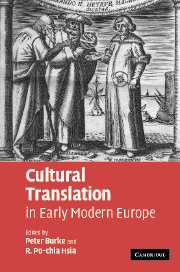Book contents
- Frontmatter
- Contents
- Notes on contributors
- Introduction
- PART I TRANSLATION AND LANGUAGE
- 1 Cultures of translation in early modern Europe
- 2 The Catholic mission and translations in China, 1583–1700
- 3 Language as a means of transfer of cultural values
- 4 Translations into Latin in early modern Europe
- PART II TRANSLATION AND CULTURE
- PART III TRANSLATION AND SCIENCE
- Bibliography
- Index
1 - Cultures of translation in early modern Europe
Published online by Cambridge University Press: 27 July 2009
- Frontmatter
- Contents
- Notes on contributors
- Introduction
- PART I TRANSLATION AND LANGUAGE
- 1 Cultures of translation in early modern Europe
- 2 The Catholic mission and translations in China, 1583–1700
- 3 Language as a means of transfer of cultural values
- 4 Translations into Latin in early modern Europe
- PART II TRANSLATION AND CULTURE
- PART III TRANSLATION AND SCIENCE
- Bibliography
- Index
Summary
Translation is always a shift not between two languages but between two cultures
(Umberto Eco)This essay has two aims: to present a general survey of translating in early modern Europe and to discuss translation between languages in the context of translation between cultures. Differences between cultures as well as languages reduce what has been called the ‘translatability’ of texts. A major problem for anyone translating comic literature, for instance, is that the sense or senses of humour of different cultures, ‘cultures of laughter’, as they have been called, are very different. Jokes fail to cross frontiers. In similar fashion they often go stale over the centuries or become unintelligible, like the references to the horns of husbands in Shakespeare, which may have had Elizabethan audiences rolling in the aisles of the Globe, but are greeted with silence today.
If the past is a foreign country, it follows that even the most monoglot of historians is a translator. Historians mediate between the past and the present and face the same dilemmas as other translators, serving two masters and attempting to reconcile fidelity to the original with intelligibility to their readers.
For example, should one speak of the ‘policy’ of a medieval king? The word does not occur in medieval texts. It was not necessary, since a medieval king did not have to convince voters to elect him by presenting them with a programme for future action.
- Type
- Chapter
- Information
- Cultural Translation in Early Modern Europe , pp. 7 - 38Publisher: Cambridge University PressPrint publication year: 2007
- 68
- Cited by



